German Chancellor Blames Iran For Hamas Support
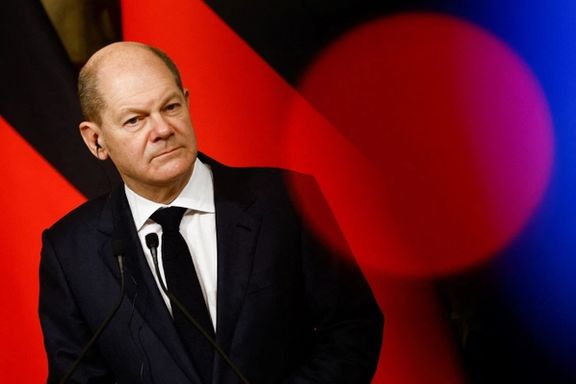
The German Chancellor has spoken against organizations supporting Hamas and held Iran accountable for the group's ability to conduct the latest invasion.

The German Chancellor has spoken against organizations supporting Hamas and held Iran accountable for the group's ability to conduct the latest invasion.
Olaf Scholz stated on Wednesday, "While we have no firm proof that Iran operationally supported this cowardly attack, it is clear to us all that without Iranian support Hamas would never have been able to launch this unprecedented attack."
He expressed concern for the growing suffering of civilians in the Gaza Strip, attributing it to Hamas and their attack on Israel.
"Sadly, we can foresee the suffering of the civilian population in the Gaza strip likely growing further but that too is the fault of Hamas and its attack on Israel," he added.
On the domestic front, Chancellor Scholz announced Germany's prohibition of all fundraising and support activities for Hamas and the ban on Samidoun, an international activist organization purportedly supporting Palestinian prisoners but criticized by German authorities for promoting hate speech and advocating for Israel's destruction.
He stressed the importance of preventing further regional escalation of violence and issued a warning to Hezbollah, another Iranian-backed militant group in neighboring Lebanon, against provoking an attack on Israel.
Scholz also highlighted his ongoing communication with key potential regional players in negotiators including the Egyptian and Turkish Presidents and the Emir of Qatar, stressing the pivotal roles the leaders can play in de-escalating the situation.
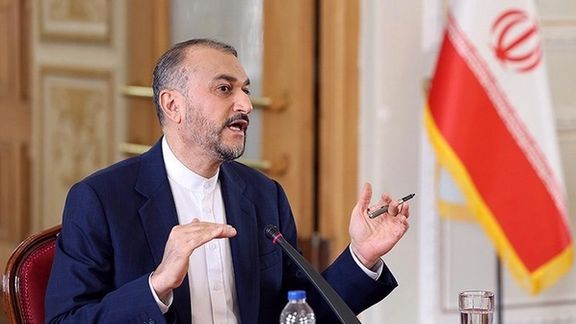
The foreign ministers of Iran and the UAE spoke about the unfolding events in Palestine on Wednesday night.
During the call, Iran's Foreign Minister Hossein Amir-Abdollahian proposed convening an emergency meeting of the Organization of Islamic Cooperation.
Emirati Foreign Minister Abdullah bin Zayed pledged to raise the request in discussions with other Arab nations, as reported by the Iranian Foreign Ministry.
Meanwhile, amid talks with the UAE, Iranian President Ebrahim Raisi told Syria’s Bashar al-Assad that all countries that "openly normalized their relations with Israel under the pretext of defending Palestinian rights have been disgraced."
The remarks are made in the context of Hamas Saturday terror attack in which the Israeli death toll has risen to 1,300. The fate of approximately 150 individuals who were abducted and taken to the Gaza Strip during this devastating attack by the Hamas terror group remains uncertain. About 3,300 people have been injured, with 28 in critical condition and 350 in serious condition.
According to the Hamas-run health ministry, Israeli airstrikes in the Gaza Strip have resulted in the death of 1,203 Palestinians and the injury of another 5,769.
The Israel Defense Forces have reported that they have eliminated around 1,500 Palestinian terrorists on Israeli territory.
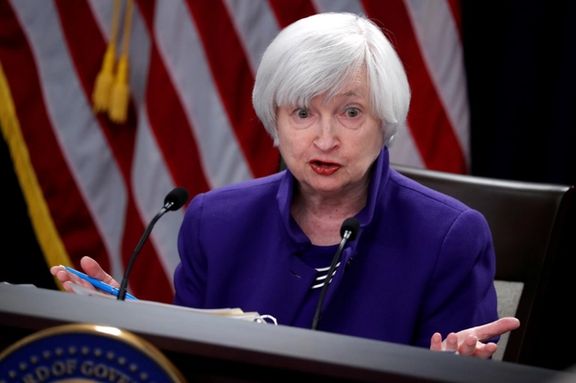
The Biden administration is not ruling out freezing the $6 billion in Iranian oil revenues that it released last month as part of a deal to free five American hostages.
The deal faced objections in Washington from day one, but it never seemed in danger until Hamas attacked Israel and killed more than 1,200 people.
In the few days since the attack, Republican lawmakers have been intensifying their efforts to make the administration punish the Islamic Republic for its support of Hamas.
On Wednesday, Treasury Secretary Janet Yellen confirmed that all options are being explored in dealing with the regime in Iran, including to block the $6 billion that was allowed to be accessed as part of the prisoner deal.
“These are funds that are sitting in Qatar that were made available purely for humanitarian purposes and the funds have not been touched,” Yellen said. “I wouldn’t take anything off the table in terms of future possible actions.”
Before Yellen, John Kirby, spokesperson US National Security Council had suggested that the funds “can be re-frozen” at any time. In an interview with MSNBC, Kirby said: “None of it has been allocated. None of it has been spent.”
But leaving the door open to a ‘re-freeze’ seems to have failed to satisfy the Republicans, who are now moving ahead with a bill that would "immediately" freeze Iran’s $6 billion.
“The civilized world must re-impose serious consequences on the regime that aids and abets murderous evil against innocent Israelis,” said Senator Tom Cotton, who has sponsored the legislation along with Senator Mitch McConnell .” The United States must lead that effort by our example, and freezing Iranian assets is an important first step.”
Remarkably, the Cotton/McConnel legislation has bipartisan support. By the end of day Wednesday, four Democratic Senators had issued statements backing a re-freeze.
“These funds should remain frozen until we can determine whether Iran played a role in the attack and what the appropriate U.S. response should be,” said Senator Bob Casy of Pennsylvania.
With the 2024 election campaign under way, the US policy towards Iran in general, and the ‘$6 billion’ in particular, could become a major issue, especially in swing states where Donald Trump won in 2020.
President Biden would likely have a harder time fashioning and implementing his Iran policy in an election year. He is keen to ease tensions with the Islamic Republic and reach an agreement that would halt the regime’s nuclear ambitions. But that could prove unpopular with the voters while the memory of the Hamas attack is fresh.
The ‘refreeze’ seems to have wide support in the Capitol. Senators McConnell and Cotton say they will seek unanimous consent to pass their legislation –which blocks Iran’s access to the $6 billion in Qatari banks.
But not everybody is in favor of a ‘refreeze’.
“If Biden re-freezes the Iranian funds,” warns Trita Parsi of Quincy Institute, “the US will completely lose any capacity to revive the JCPoA or come to a new agreement limiting Iran's nuclear program.”.
Many believe that to be a positive outcome, however, as they are against the JCPoA to begin with.
“Belatedly rejecting Biden’s reckless ransom payment of $6B in sanctions relief isn’t enough,” said Senator Bill Hagerty posted on X Wednesday. “After Iran-backed Hamas slaughtered >1,000 ppl in Israel, Democrats should support Maximum Pressure — including the US and EU triggering automatic snapback of JCPoA-lifted sanctions at the UN.”
The regime in Iran is still celebrating the attack on Israel. It may find it harder to celebrate when the consequences of the attack become clearer.
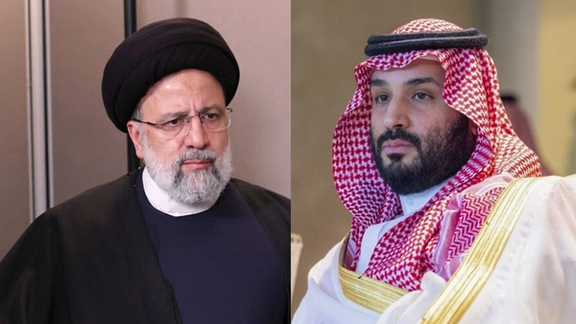
Iranian and Saudi government media reported a phone conversation between President Ebrahim Raisi and Crown Prince Mohammed bin Salman on the armed conflict between Israel and Hamas.
The Saudi official news agency said that bin Salam received a call from the Iranian President on Wednesday, and they discussed “the ongoing military escalation in Gaza.” The Crown Prince emphasized Saudi Arabia’s efforts to halt the military escalation and protect innocent lives.
According to the Saudi news agency bin Salam “asserted the Kingdom's opposition to any form of civilian targeting and the loss of innocent lives. He stressed the necessity of adhering to the principles of international humanitarian law and expressed deep concern for the dire humanitarian situation in Gaza and its impact on civilians.”
The Iranian side used somewhat different wording to describe the discussion. Mohammad Jamshidi, a top aide to Raisi reported that both sides discussed the need “to stop war crimes.” He also said that the phone conversation lasted 45 minutes and the two sides emphasized Islamic unity and “crimes of the Zionist regime.”
Iran has been the main provider of financial and military assistance to Hamas and other militant organizations fighting Israel.
This was the first meeting between the de facto ruler of Saudi Arabia and the Iranian president since the two countries re-established relations earlier this year with Chinese mediation. Tensions have existed between the tow regional powers for a decade as Iran established a military presence in Syria during the civil war since 2011 and expanded its influence throughout the region using militant militia organizations it supported.
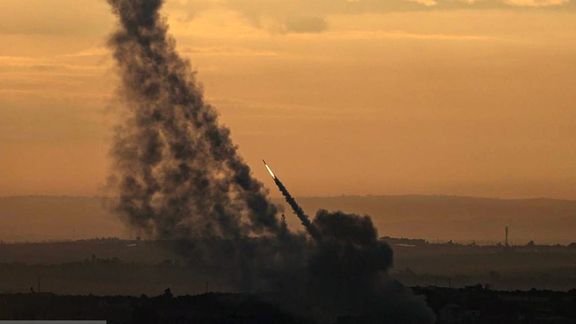
Expressing a balanced view on the Israeli-Palestinian conflict in Iran is risky, as all media are meant to echo the official stance of the Supreme Leader.
However, several social media users noted on Tuesday that even Ali Khamenei sometimes has to retract what he had said earlier without apologizing to anyone or at least make it known that he has changed his view or pretends to have changed it.
On Tuesday, when Khamenei changed his view about Iran's involvement in Hamas terror attack, several social media users compared his previous comment. Earlier, Khamenei had said, "We intervened due to our enmity with Israel and the result was the victory in the 33-day and 22-day wars. We will help any group that would fight Israel." But his opinion was different on Tuesday after being cautioned and warned by US officials: "Islamic Iran is being named as the country behind this move [by Hamas]. But they make a mistake. This was done by Palestinians themselves."
Others in Iran, particularly journalists or media commentators, do not have the luxury of changing their minds voluntarily or otherwise. If the support Hamas in the current war, they are on the safe side. Reminding that Israelis are also entitled to be safe from terrorist attacks is not an option. Judging views from Iran on this matter need to take this reality into account.
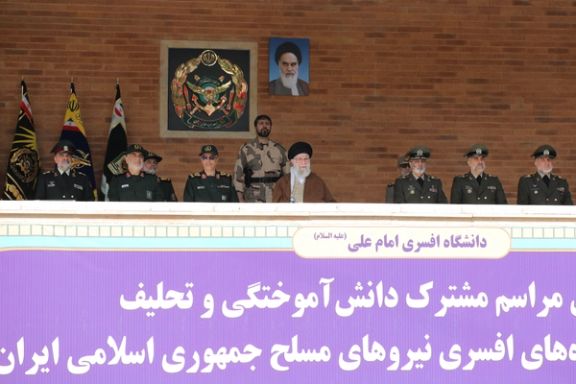
In one of such views expressed by former diplomat Jalal Sadatian, he told Roiuydad24 website: "Israel has done something in Gaza that put an end to Palestinians' tolerance. It was Netanyahu's policies that turned Hamas' defensive policies to aggressive action." This view obviously ignores the fact that Hamas has a military wing with an offensive agenda.
Like all Iranian commentators, Sadatian reverted to the history of the conflict between Israel and Palestinians and the violence by a Lebanese group in Sabra and Shatila in 1982 during the Lebanese civil war charging that the group was an ally of Israel. Meanwhile he blamed Israeli Prime Minister Benjamin Netanyahu for all recent violence against Palestinians ignoring that the attack on Saturday was a surprise operation by Hamas.
The most significant part of Sadatian's analysis is that "Hamas has had no aggressive approach during the past few days." This comes while Hamas slaughtered at least 250 men and women at a music festival as the starting point of its attack on Israel on October 7.
Meanwhile, in an analysis in the reformist daily Shargh, Hassan Lasjerdi commented, “Israel is likely to start a major operation to make up for its biggest intelligence and security defeat as a result of the great operation launched by resistance forces." There is an outright bias in the terms "great operation" and "big defeat."
Lasjerdi further characterized Israel's situation as a "military fiasco" and praised the Hamas operation as "the great Al-Aqsa Storm." Like most Iranian analysts, Lasjerdi could not care less for "impartiality" as an essential characteristic of any reporting.
Meanwhile he opined that there are three scenarios ahead for Israel: A limited attack on Gaza and Palestinian territories, attacking the “resistance” bases in regional countries, and getting several countries involved in a larger scale war in the Middle East.
He further opined that the third scenario is not feasible in terms of Israel's political and military capabilities and its economic potentials. He also ruled out the second scenario by saying that Israel cannot fight the “resistance forces” in Palestine as well as the armies of Syria and Hezbollah in Lebanon. However, Israel is currently fighting Hamas and Hezbollah at the same time, while Syria and Iran are too intimidated to get directly involved in the conflict.
Another analyst, Kourosh Aliani, who is known for his anti-Israeli views, praised Hams' operation as a "unique strategic offensive". Aliani claimed that Hamas has used infiltrators in the Israeli army to collect intelligence for a whole year before the operation.
This is an example of a series of Iranian analyses by individuals who claim to have access to insiders, but their claims are hard to substantiate, but easy to dismiss.

The government-linked Borna news agency reported Wednesday that Armita Geravand’s health has “somewhat” deteriorated.
"Armita Geravand's vital signs, which were relatively stable, have changed over the past few days and have somewhat worsened," reported the news agency linked with the Islamic Republic's Ministry of Sports, without providing further details. It stated that the medical team is still working to improve her condition.
The teenager allegedly fell into a coma after being assaulted by hijab enforcers on her way to school at Tehran subway ten days ago. Authorities have significantly restricted the family's access to Armita at Fajr military hospital in Tehran.
Armita’s serious head injury, which authorities claim she sustained when she fainted on a subway car, serves as a stark reminder to many Iranians of the death of Mahsa Amini in September last year. Mahsa's death ignited months of protests and unrest across the country, and the government is still refusing to accept responsibility for it.
Armita’s mother was briefly detained by security authorities last week ago after protesting their refusal to allow her to see her daughter. Armita’s father was only permitted to see her after agreeing to a televised interview in which he endorsed the official account of the incident, which excludes the role of hijab enforcers.
Independent media outlets have been denied access to the hospital, and they are not allowed to speak with the family. Maryam Lotfi, a reporter who tried to interview Armita’s mother on the day of her hospital admission, was briefly detained. She has refrained from making any comments about her arrest or the incident since then.
The news of another young girl's life-threatening injury, along with televised interviews with her parents and classmates, which many believe were "forced," has outraged many Iranians who are being kept in the dark about her circumstances.
"The Islamic Republic has no legitimacy in the eyes of the people who are certain that the regime is lying about Armita Geravand, as it has always done. The regime has been using forced interviews with Armita's family and friends in an attempt to convince the public that the incident was only an accident," a representative of the United Youth of Iran (UYI) told Iran International.
Iranian social media users have extensively alleged in the past ten days that authorities are deliberately withholding all information about Armita and making every effort to silence her family, with the hope that her case will eventually fall into oblivion amidst the news of the war in Gaza and Israel.
Footage of Armita's presence at the subway station and an audio file of the call made by an employee of the Tehran Metro to the emergency services, which state media have released, have not been able to convince the public that hijab enforcers were not involved in the incident.
Serious suspicions that the footage and audio file were doctored by the authorities to conceal the truth were raised in a long tweet on October 9 by an anonymous user who posts as Avand Fardi.
Fardi, who claims to have meticulously examined and analyzed the video footage and audio file, concluded that either three black-veiled women, who were hijab enforcers on the platform, or a fourth person in the car must have been responsible for assaulting Armita. However, he believes the audio and visual evidence was doctored to conceal this fact.
Furthermore, he has highlighted a discrepancy in the audio file concerning the explanations provided by the metro staff regarding the circumstances leading to the young girl's injury, presumably inside the car where the authorities claim there was no CCTV.